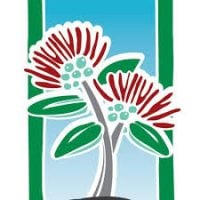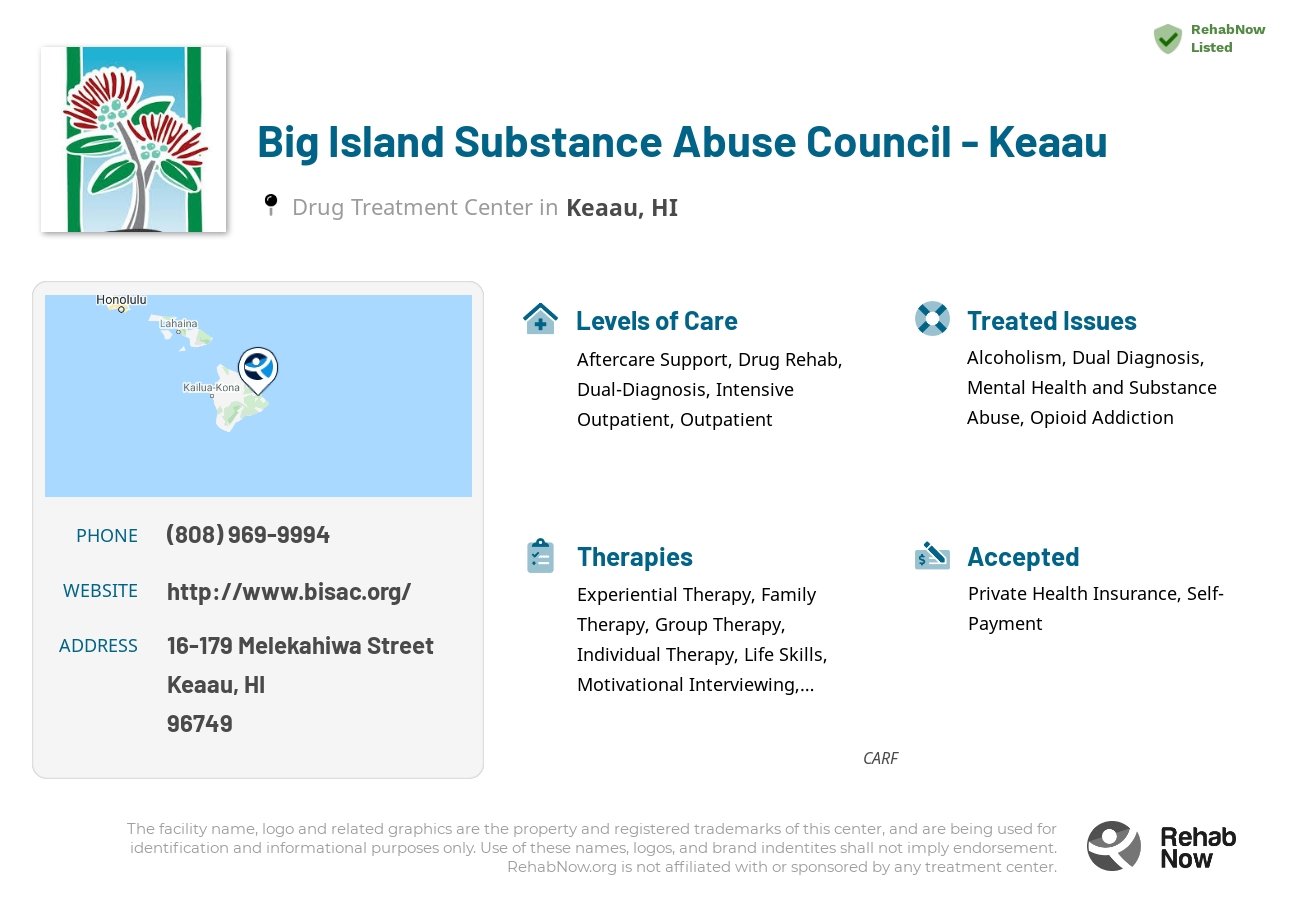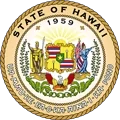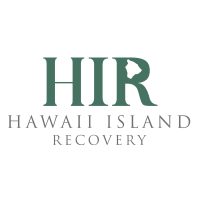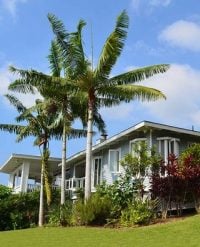Big Island Substance Abuse Council - Keaau
Drug Rehab Center in Keaau, Hawaii
Big Island Substance Abuse Council - Keaau is a non-profit organization in Hawaii providing addiction and substance abuse services, including counseling, education and prevention programs, and comprehensive treatment plans, regardless of a client's ability to pay.
About Big Island Substance Abuse Council - Keaau in Hawaii
Big Island Substance Abuse Council - Keaau, located in Keaau, Hawaii, is an Addiction Treatment Facility that has been providing services since 1956. As an accredited facility by CARF, the Council is committed to delivering high-quality care and treatment for individuals suffering from addiction. They specialize in helping individuals with alcoholism, dual diagnosis, opioid addiction, and drug addiction. Big Island Substance Abuse Council - Keaau offers a range of levels of care including aftercare support, drug rehab, dual-diagnosis treatment, intensive outpatient programs, and outpatient treatment. Their comprehensive approach to addiction treatment is designed to address the unique needs of each individual, providing them with the necessary tools and support for a successful recovery. Additionally, Big Island Substance Abuse Council - Keaau accepts private health insurance, making their services more accessible to those seeking treatment.
Big Island Substance Abuse Council - Keaau provides a variety of services to support individuals struggling with addiction and substance abuse. Their aftercare support program ensures that individuals continue to receive the necessary support and guidance even after completing their primary treatment. In their drug rehab program, individuals are provided with evidence-based treatments and therapies to help them overcome their addiction. The facility also specializes in dual-diagnosis treatment, which addresses both substance abuse and co-occurring mental health disorders. With intensive outpatient programs, individuals have the flexibility to receive treatment while still maintaining their daily responsibilities. The outpatient treatment option allows individuals to receive regular counseling and therapy sessions while continuing with their daily lives. These services are aimed at providing individuals with the necessary support and tools to achieve long-term recovery and a healthier lifestyle.
Genders
Ages
Modality
Additional
Accreditations

CARF
The Commission on Accreditation of Rehabilitation Facilities (CARF) is a non-profit organization that specifically accredits rehab organizations. Founded in 1966, CARF's, mission is to help service providers like rehab facilities maintain high standards of care.
Conditions and Issues Treated
Many people who struggle with opioid addiction need to attend specific programs like methadone , Suboxone or Vivitrol clinics.
These types of programs will provide the patient with legal, prescription medications that can help them overcome their cravings for illegal opioids like heroin or fentanyl . If the patient has a chronic condition like Hepatitis C, they must undergo treatment before they can begin taking these medications.
Dual Diagnosis is a specific relationship between two or more disorders that have the same symptoms and can sometimes be treated together. This is used in the treatment planning process when dealing with drug addicts. Dual diagnosis can be viewed as a chronic medical condition that has comorbid psychiatric disorders.
Although addiction and a mental illness may have separate symptoms that are not easy to detect, they often go hand in hand. Many times, drug abuse is a direct result of the mental illness. In other words, treating the addiction will not resolve all of your issues. Unless you also treat the underlying mental illness, you will not be successful in achieving sobriety.
Levels of Care Offered
This center offers a variety of custom treatment tailored to individual recovery. Currently available are Aftercare Support, Drug Rehab, Dual-Diagnosis, Intensive Outpatient, Outpatient, with additional therapies available as listed below.
An intensive outpatient program is usually the first phase of addiction treatment. It provides relief for those who are addicted, but are not ready to commit to an inpatient setting. Typically, the patient lives at home and is able to work or go to school. IOPs consist of a daily 3 to 5-hour program, and there is a required number of hours per week. Most patients go to IOP between 20 and 40 hours per week. The patient attends group counseling and individual therapy throughout the duration of treatment. They also meet daily with their therapist to discuss how it’s going and where they are in the recovery process.
The goal here is to teach patients healthy coping skills, such as stress management and identifying thoughts and behaviors that lead to relapse. The implementation of these skills will be useful as the individual transitions into the next phases of treatment.
An outpatient treatment program is set up to help with alcohol or drug addiction, or a co-occurring disorder. The patient must attend the Hawaii facility for their therapy and other programs but are able to return home each night. The frequency of mandatory attendance decreases after much of Big Island Substance Abuse Council - Keaau‘s program is complete.
Aftercare is a term that’s used to refer to any sort of continuing care offered for a drug addict who has voluntarily entered a rehabilitation program. This type of care can be provided in several settings, including outpatient therapy sessions after the addict has completed an inpatient program. There are also 12-step support groups, such as Alcoholics Anonymous, which can provide additional help for addicts trying to stay sober.
Therapies & Programs
Individual Therapy is a critical component of addiction recovery. Therapists work with patients to identify the root of their addiction and figure out how to better handle the issues that led to them using drugs. Individual Therapy is the one-on-one session where people meet with their therapist. Individual therapy provides a safe space for people to open up and discuss personal and sensitive topics which they may not feel comfortable discussing in a group setting.
Family therapy will also help families realize that the addiction is not their fault. For many years, people blamed themselves for an addict’s behavior and felt that they had done something wrong. This is not the case. Addiction is a disease, and it can strike anyone, even if their life seems fine from the outside. It can bring a lot of shame to a family when they have an addict in their midst, but if everyone is open and honest with each other, then they can help everyone stay in recovery.
Group Therapy is utilized by drug treatment centers like Big Island Substance Abuse Council - Keaau to provide the recovering drug addict with a platform to talk about their feelings and experiences. It also provides for an opportunity to learn from other addicts who have successfully overcome their addiction.
Group Therapy is employed in lectures, seminars, or discussion groups (the latter two are typically conducted as “therapy groups”). It is recommended that all group members be recovering addicts for this type of therapy to work (though it does not exclude others with lived experience).
Trauma therapy is a clinical process that helps individuals deal with mental stress often caused by traumatic events. It is generally done for children, teenage victims of sexual assault, and war veterans. The therapist helps the person identify, understand and work through the problem. This is done with the help of talking about it in group or one-on-one counseling sessions. Therapists use relaxation, role-playing, art, and music to help the person open up about what is bothering them.
Cognitive behavioral therapy is also a popular service for individuals living with addiction. This type of supportive treatment uses both one-on-one counseling and group sessions to teach addicts how to identify thoughts, behaviors and emotions that might increase their risk of relapse.
These professionals can help addicts develop coping skills for managing stress, improving self-esteem and overcoming triggers. They might also use behavioral therapy to help addicts learn how to avoid cravings and warning signs that could lead them back into addiction.
Therapy can be used as a step-down from inpatient treatment or as the primary method of overcoming an addiction. No matter which option is best for the addict, they will teach important emotional coping techniques, which can make it easier for addicts to get through the tough days.
Training in improved life skills helps those recovering from addiction feel more capable of self-care. Big Island Substance Abuse Council - Keaau are daily skills that give the person the tools they need to survive.
The therapy covers practical activities like cooking, job hunting, social interaction, and money management, helping to fill in the knowledge gaps caused by addiction.
These life skills help the person self-manage their recovery and stay on track. It also reduces relapse risk as they gain confidence in their day-to-day abilities.
Patient Experience
Experiential Therapy at Big Island Substance Abuse Council - Keaau
Experiential therapy is another form of treatment that helps addicts overcome their addiction. This type of service typically involves hands-on activities with the focus on physical experiences instead of emotions or beliefs.
Some examples include art therapy, equine therapy and music therapy. Each of these forms of experiential therapy can provide unique ways for addicts to channel their feelings and work through their demons. This type of therapy also allows addicts to develop meaningful emotional connections with others, which can prevent them from resorting to relapse as a coping mechanism.
Payment Options Accepted
For specific insurance or payment methods please contact us.
Is your insurance accepted?
Ask an expert, call (888) 674-0062
Big Island Substance Abuse Council Associated Centers
Discover treatment facilities under the same provider.
- Big Island Substance Abuse Council - Kailua Kona in Kailua Kona, HI
- Big Island Substance Abuse Council - Ka Wahi Ola Hou in Hilo, HI
- Big Island Substance Abuse Council - Hilo in Hilo, HI
- Big Island Substance Abuse Council - Connections in Hilo, HI
- Big Island Substance Abuse Council - Laukona House in Hilo, HI
Learn More About Big Island Substance Abuse Council Centers
Additional Details
Specifics, location, and helpful extra information.
Keaau, Hawaii 96749 Phone Number(808) 969-9994 Meta DetailsUpdated November 25, 2023
Staff Verified
Big Island Substance Abuse Council - Keaau Patient Reviews
There are no reviews yet. Be the first one to write one.
Keaau, Hawaii Addiction Information
Hawaii has one of the highest rates of drug abuse in the nation. Methamphetamines and marijuana are the most common drugs involved in drug-related crimes in Hawaii. The state loses $500 million every year due to methamphetamine abuse, according to the Hawaii Meth Project. More than 1 million prescriptions for prescription drugs are given out every year.
In Keaau, Hawaii, drug addiction is a significant problem. 4,574 people in Keaau were dependent on abusing alcohol, which accounted for about 3.8% of the population of the city. Cocaine is the 2nd most commonly used illicit drug in the area. 1 in 10 people will abuse prescription drugs at some point. No matter your particular needs, there is a drug treatment facility in Keaau, HI, that can help you get sober.
Treatment in Nearby Cities
- Kahuku, HI (235.1 mi.)
- Kailua, HI (212.9 mi.)
- Naalehu, HI (52.7 mi.)
- Pearl City, HI (225.3 mi.)
- Kaunakakai, HI (163.0 mi.)
Centers near Big Island Substance Abuse Council - Keaau
The facility name, logo and brand are the property and registered trademarks of Big Island Substance Abuse Council - Keaau, and are being used for identification and informational purposes only. Use of these names, logos and brands shall not imply endorsement. RehabNow.org is not affiliated with or sponsored by Big Island Substance Abuse Council - Keaau.
